With the issue of Scottish independence again being discussed, the issue of Royal Navy shipbuilding in Scotland has become controversial once again.
One side, the Scottish government, say that naval shipbuilding would continue if Scotland left the UK. The other side, the UK government, say it would not.
This article is a fact checking article, if you believe we’ve made an error you can submit a correction in line with our correction policy.
“No warships would have been built on the Clyde, because the United Kingdom Government would not have chosen to build them there.”
The issue of UK naval contracts in Scotland has been a hot topic both before and after the 2014 Independence Referendum and even more so recently when several groups indicated that the work on complex warships for the Royal Navy would not go to an independent country.
Nicola Sturgeon earlier insisted that it would be a betrayal to go back the promise to build the frigate fleet in Scotland. Sturgeon said:
“Promises were made about orders to these yards and promises were made about jobs at these yards, and I think it is absolutely vital now these contracts are delivered. These yards have been through some really difficult times with a reduction in the workforce, and they thought that that was all part of the process of getting themselves into shape for the Type 26 and securing a level of employment here. This is about jobs and securing jobs in an industry. It would be a complete betrayal of these yards if there was any U-turn or going back on on promises made.”
The original plan for the Type 26 had been eight anti-submarine warfare variants and five general purpose variants, this changed when five if then were cancelled, with the gap in orders having been filled by five River class Offshore Patrol Vessels and Rosyth being awarded five Type 31e Frigates.
For more on what’s going to be built, have a look here.
Doesn’t the UK build ships overseas anyway?
Before the referendum, many were accused of exaggerating how secure the shipbuilding industry would be after independence. This came about due to comments made by Geoff Searle, director of the Type 26 Global Combat programme indicating that they had no back–up plan to the Clyde if a ‘Yes’ vote was returned. However, the Ministry of Defence, the shipbuilding union and BAE themselves all claim that major warship builds would be reconsidered if Scotland left the UK.
Many in industry rejected this interpretation, advocating the position that no alternative plan did not rule out the possibility of the UK Government rethinking investment in the Clyde in the event of independence, something which was later confirmed by ministers.
“The Government is not making contingency plans because we are confident that the Scottish people will vote to remain part of the UK. No Royal Navy warships have been built outside the UK since the Second World War for national security reasons and we have no intention of doing so in future.”
Many have also misconstrued the building of naval tankers in South Korea for the RFA as a break in this policy, that is not the case. Support vessels like this are eligible to be constructed outside the UK as only ‘complex warship’ construction (such as frigates) must stay within UK borders. Besides, no UK yard bid for the work.

Other than procurement activity undertaken during the World Wars, the UK has not had a complex warship built outside of the UK since the start of the 20th century at least. All of the Royal Navy’s new complex warships are being built in UK shipyards and the UK Government says it remains committed to utilising the strengths of UK industry in this specialist and complex area.
American influence
One key factor that could potentially impact the ability of an independent Scotland to continue with its current level of military shipbuilding is the International Traffic in Arms Regulations (ITAR).
ITAR is a set of regulations that govern the export of defence-related items from the United States. These regulations are administered by the US Department of State and are designed to ensure that defence-related items are not transferred to countries or organisations that may use them for nefarious purposes.
To comply with ITAR, countries must obtain a license from the US Department of State before exporting defence-related items. This can be a lengthy and complicated process, and it is not clear whether an independent Scotland would be able to obtain the necessary licenses.
Another factor that could potentially impact the ability of an independent Scotland to continue with its current level of military shipbuilding is the UK government’s policy on building warships outside of the UK. Currently, the UK government has a policy in place that requires all warships to be built in the UK, with the exception of certain naval auxiliaries that may be built abroad.
This policy is based on a number of factors, including the desire to maintain a skilled workforce within the UK, the need to protect sensitive technologies and intellectual property, and the importance of ensuring that the UK can build its own warships in times of crisis. If Scotland were to become a separate country, it is not clear whether it would be able to continue building warships for the UK or whether it would be subject to the same restrictions as other foreign shipbuilders.
An independent Scottish state would be a third-party country not covered by existing UK-US ITAR agreements. UK companies would not have the authority to transfer items and information subject to ITAR licence to their subsidiaries or other companies in an independent Scottish state or a Scottish national without US approval any more than it could transfer such material to organisations or individuals in other foreign states.
Every licence held by companies in Scotland working on ITAR-controlled items would have to be re-approved if Scotland became independent. This is a very lengthy process.
Isn’t Scotland the only location in the UK capable of building warships?
Claims at the time of the referendum that the only option for BAE on the event of independence was to continue to build the ships in Glasgow were refuted at the time by John Dolan, GMB convenor at the Scotstoun yard in Glasgow:
“She was saying that the Clyde is the only game in town. I’m afraid it is not. There’s shipbuilders in Cammell Laird in Liverpool. You have got the A&P Group on the Tyne, who are shipbuilders, and you have got Barrow in Furness.
So to say if Scotland goes independent we will still be building Type 26 frigates… listen, I assure you that if we go for independence we will not be building. We have been told quite clearly by the UK government and I have been told quite clearly that will not happen.”
What are the builders saying about this?
Ian King, former chief executive of BAE, had previously indicated in a letter submitted to the Scottish Affairs Committee before the referendum that shipyards on the Clyde would likely have to close if Scotland were to leave the UK. Mr King said BAE would build the ships at a location compatible with the contract awarding process of the Ministry of Defence:
“In the event of a Yes vote, and as we have made clear, we would be required to discuss the future of the Type 26 programme with our customer, the MoD. It would be for the MoD to determine how the vote affects the final decisions they have yet to make on the programme, including the future location of the build of the ships. We would take our customer’s lead in these circumstances. We cannot determine this outcome in advance, or without the direction of the MoD.”
Babcock, however, has been less clear-cut in their response. The firms chief corporate affairs officer confirmed that there are no plans to move the Rosyth Shipyard in the case of an independent Scotland. Babcock’s John Howie said that the firm’s recent £76 million investment into the Rosyth dockyard proved that the site was “a core part of our business strategy” during a Scottish Affairs Committee briefing.
Asked about a second independence referendum, Lockwood said:
“I lived in Scotland for 10 years and it was a rumbling thing then and I think it’s just going to be a rumbling thing. I think in reality there will be plenty of warning if the vote were in favour of independence. There would then be a negotiation period and at the end of the negotiation period there would be an implementation period.
I don’t think there is anything that we can’t manage as a company. When you look at the timelines, there’s nothing we can’t manage as a company. If we had to replicate this in England because we were told we weren’t welcome here – which I think would be a bad mistake for Scotland – but if that were the decision, we can replicate this in three years, and the time window of negotiations is longer than that. It’s not ideal but it is manageable.”
The company suggests it, like BAE, will stay if it can.
The Ministry of Defence, the customer referred to above by Mr King, has recently made clear that leaving the UK would influence the ‘location of the build of the ships’. The full statement, an excerpt of which is displayed at the top of this article, was made by then Minister for Defence Equipment, Support and Technology with responsibility for Defence procurement and Defence exports in response to a question from Brendan O’Hara, MP for Argyll and Bute, regarding the Type 26 frigates.
“What I can confirm to the hon. Gentleman is that, had the independence vote gone the way that he and his colleagues would have liked, no warships would have been built on the Clyde, because the United Kingdom Government would not have chosen to build them there; we made that very clear. As it is, as I have just confirmed to the House, we will be proceeding with the construction of eight complex Type 26 warships on the Clyde as and when the programme is ready.”
What about Scottish naval vessels?
Scotland would still need a navy, right? Up-to-date facts on what an independent Scotland would operate at sea, let alone what it would build, aren’t easy to come by. The SNP earlier proposed that under independence, Scotland would:
“Take over existing naval, army and air force bases within Scotland and inherit a share of defence equipment in negotiation with the rest of the UK.”

This leaves seemingly little needing to be built, and any ships that would be constructed would likely be a few Offshore Patrol Vessels.
Professor Keith Hartley recently claimed that the Scottish naval shipbuilding industry would likely end if Scotland left the UK.
“An independent Scotland will presumably have a minute Navy—it will be like Ireland’s, for example, with offshore patrol vessels. It won’t have the demand for deep-water frigates and destroyers of the sort that are currently being built in Scotland, such as the Type 26 and Type 31. It won’t have that demand. It couldn’t afford them, anyhow—the unit cost for a Type 31 frigate is £250 million at least.
I do not know the size of an independent Scotland’s defence budget, but it is not going to be large. I do not think it would put a lot of resources into building advanced warships. In short, no, I do not see a future for a Scottish warship building industry in an independent Scotland.”
Given that the already slow drumbeat of MoD orders is barely enough to sustain the yards, this doesn’t bode well for the yard’s future if Scotland chooses to leave. Put simply, a couple of ships are not enough to sustain one of the largest shipyards in the UK.
The above being said… who knows?
So, there are a couple of things that could potentially cause problems for Scotland’s military shipbuilding industry if the country were to become independent. One is ITAR and the other is the UK government’s policy on building warships.
Right now, as explained above, the UK only allows warships to be built within its own borders, with a few exceptions for naval auxiliaries. This policy is in place for a bunch of different reasons, like keeping a skilled workforce in the UK and protecting sensitive technology.
If Scotland became independent, the country would not be able to build warships for the UK. Even if it didn’t build warships for the UK, and with attempts at attracting export builds at Scottish yards largely failing, would the yards survive building solely for Scotland?
Military shipbuilding in Scotland currently supports 7,500 jobs in Scotland directly, with an estimated 9,000 being supported by the industry, many of which are highly skilled. Maintaining this employment, and a flourishing sector, relies on a regular ‘drumbeat’ of orders.
If not, would the industries that might potentially take their place be able to sustain as many high-end engineering jobs? It’s tough to say for sure how independence would impact Scotland’s military shipbuilding industry. There are definitely some potential challenges that would need to be overcome, but it’s impossible to predict exactly how things would play out.


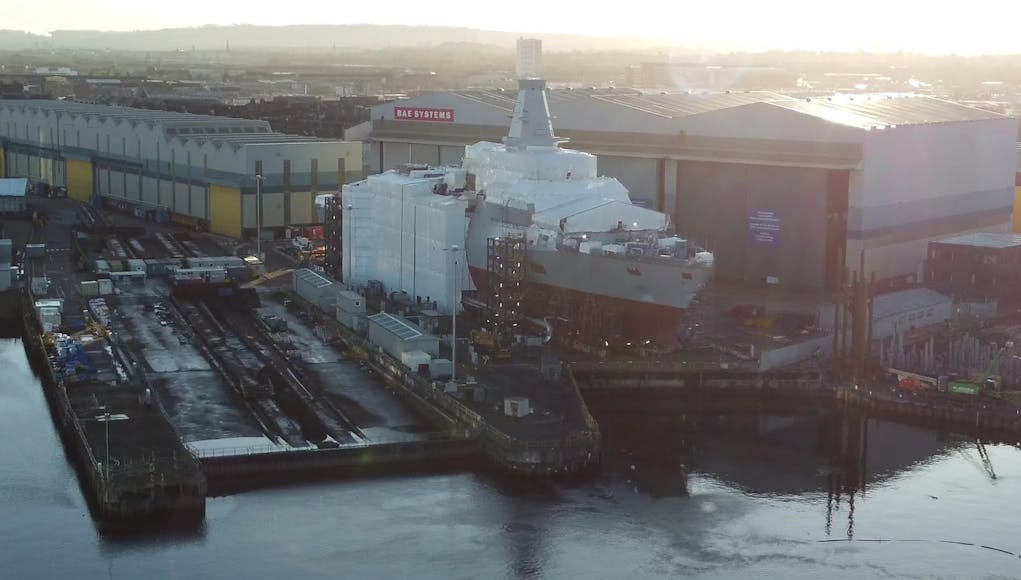




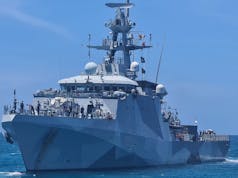
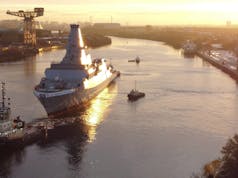
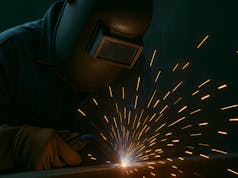
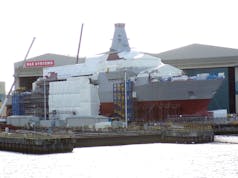




I believe this smacks of whats called a “click bait” headline. It would be easier to discuss, for instance “how long is a piece of string?” Or..”what would happen if Martians invaded?”
AA
People in Scotland voted to be part of the UK, no one else in the UK ever voted to be in it and once you agree to join it’s effectively un revocable just ask Texas.
We won’t see another Scottish referendum short of a threat of civil war and very few people in the SNP are prepared to go that far.
Once the Tory’s are gone and the UK starts to move back towards the EU independence calls will drop from the 40% to the 30% region which is not that different to other large states in unions with country like characteristics like England, Texas or California.
Yes rightly or wrongly they did, based on demonstrated lies false promises and misinformation. However you do not have a full understanding of the situation. There is a treaty of union, which is in addition to the much earlier joint crown. This treaty was entered into by two parties. So as with ALL such treaties it is up to either or both sides to review that and suspend or withdraw from that treaty if they so wish – and accept the consequences. There is no provision in that treaty that says it cannot be rescinded. Your assertion is factually wrong and unsustainable. We may or may not see another referendum but you cannot say there won’t be. In any event the point of the article is about RN shipbuilding, and NOBODY has asserted or implied that in the event of Scottish Independence RN would build ships in Scotland. All other arguments or comments are irrelevant in the context of the article.
Yes, click bait. Leading to pointless arguments from people who think that ‘shipbuilding’ only means RN warships! If the article were headlined differently a different class of blinkered arguments would arise instead!
The Martians? Where? Oh no…👽
Isn’t this an old article? There was one like it from ages and ages ago
Old ideas but from a more recent perspective. Now with Ukraine war sovereign capabilities are all the range for defence ministers.
Cammell Laird is the best option for future navel projects, they build better ships.
And you base that statement on ………
Zero Naval ships built since 1992, some parts of the QE’s, 3 small ferry’s and most a Research vessel (which was delivered a year late).
The article headline states ‘shipbuilding’. It does not specify what sort of ships or who for! Clickbait.
We were happy to do that in WWII. Warships are the only thing that we insist on being a national build. Everything else relies to a huge extent on imported parts or as whole entities. Even the QE/PoW used foreign engines, radar, relies on US assembled aircraft, and so on. The only indiginous thing guaranteed was that the major structures of the ships were assembled in UK.
You have never taken a ship in to or out of CL. They need a lot more infrastructure and capital. In addition you need shipyards around the whole of the UK independent like Vospers and Vickers used to be????
Andy, Not Clyde I’m talking about Camell Lairds. RFA issue is contract driven and OEM support. Both poor hence major effect on hull numbers
And faster the production rate of the CLyde is a disgrace
Have you ever worked on an MOD build project as an Engineer, project Manager or Workflow Manager. I suspect not !
Actually the disgrace is 100% down to MOD and the Treasury. The ships are built on an agreed plan and timescale as per the contract.
The single reason is it so slow is because of how the staged payments are made and when.
If MOD decides to speed a build up then it has to find more money faster, so something else gets slowed down or cancelled.
Same issues on the QE’s, Astutes, T45’s etc etc.
The other small matter is if you build Class A of 8 ships quicker than planned and nothing else is ordered then what do you do with the workforce ? Yep lay them off, sell the machinery and can never build anything else to replace Class A.
I suggest you sit down and Google The National Shipbuilding Strategy then read it very carefully.
Then comment 🤔
It’s worth noting that the build time for Dreadnaught is twice that of Vanguard. Not sure if Cumbria is considered part of England 😀but as you say it’s pretty clear that ship building times are down to the MOD and not slow workers on the Clyde.
The production rate is set by the MOD based on what they can afford.
BAE will happily increase production if the MOD can afford to buy.
Which ships have they built? Please list but only use ones where the ship builders are still of working age.
This thing called Scottish independence died at birth. And if you think it did not die at birth, it died in the 2014 Referendum. And if even that leaves you unconvinced, the implosion of the SNP and Humza Yousaf is killing it by a 1,000 cuts.
Wake up and smell the coffee!🙄
But the SNP have good taste of motorhomes
With discount a very reasonable buy apparently🙄
Yeah the only time it would be acceptable to build RN ships outside of the UK was in WW2 when it was the British Empire
Harland and Wolff have a couple of Scottish fabrication plants so FSSS construction will include a Scottish element.
Eventually
Scotland building ships. Any more jokes. Can’t even build a ferry.
It looks to me like Scotland would very soon be an outlier of Putin. Same as Republic of Ireland once Trump takes over and USA leaves NATO; unless the French and Spanish take over.
Is this on auto repeat every 6 months?
Scotland would lose the entire industry as policy is warships are built in the UK. And the rest of the UK would be very grateful to take the work from them!
Move the sub base to the uk as well, hell, base them near me for all I care! The area would benefit from the associated jobs and support business that comes with it.
Wait 6 months to find out 😂😂😂😂
Give them independence and watch the mige eat everybody
If rosyth was to close in this hypothetical situation the old nuclear subs there would need to be moved out aswell.
Really nothing could be decided until the future relationship between the countries was worked out.
All speculation anyway as core won’t be happening for a long time. If ever.
But the yards can transfer their skills to the production of 100k motohomes, with a long term contract from the SNP!
As others have said.. this is click bait and repetitive and rather out of touch. But it also ignores a rather obvious point. No Scotland means no United Kingdom. England isn’t the UK, much as it likes to think so. England doesn’t own the armed forces, unless they are occupying forces in Wales, Northern Ireland and Scotland!. They’re as much Scottish, Welsh and Northern Irish as English… so many of the comments on here sound as though they come from no more than 50 miles from London!
Once you argue that England is the biggest by far then you give the game away… Wales and Northern Ireland would by held inside a reduced “UK Lite” by force of economics and nothing else. They would vassal states. If they’re not already.
An independent Scotland means the end of the UK in any workable sense. On the other hand it would be perfectly sensible for Scotland to keep the armed forces in a federal arrangement. But that might not be popular down south. It would make sense for the Irish Republic to join in to, as they can’t seem to afford to get a viable military going on their own.
OK, I’m flying some kites… to see how high they get!
Speaking as a patriotic Scot, One day the nationalist will realise whether it is warship construction, border trade, pensions or any of the other Madrid issues that would come to the fore post Indy. Just because , Sturgeon say it will happen, does not mean it will .
I have built ships in the UK, in South Korea, in China and in Japan. By a country mile, Japan was the best at everything, and Britain was the worst.
Please can we stop this absurd programme of outdoor relief for laziness and incompetence and order all further naval ships in Japan.
Its the only way we will get ships that work and its the only way we can afford a Navy.
You know this is true.